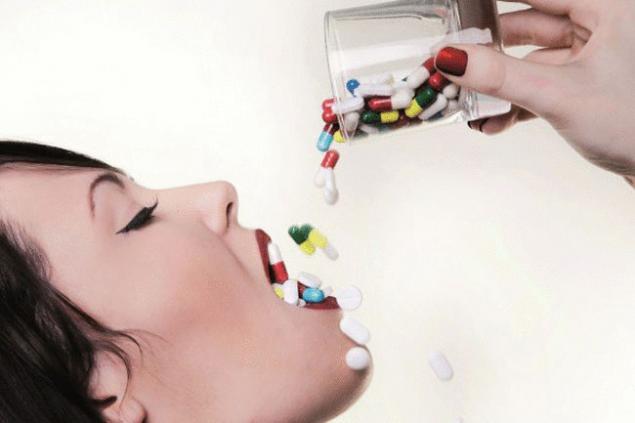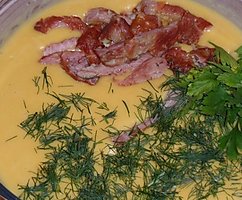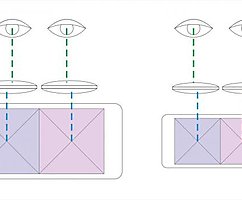Diseases if lack of vitamins
 Bashny.Net
Bashny.Net
Vitamins are the valuable substances, due to which we are able cheerfully and properly walk through life, not lying at home in bed, crouched from various diseases. The lack of a vitamin always indicates a failure in the body, and its failure to do so leads to even more ailments. How do you know what the body lacks, than to remedy the lack of vitamins, and what threatens the lack of it?

The main signs of lack of vitamins
Table a 1.2: the Main symptoms of lack of vitamins and minerals in the human body
What symptoms appear when a shortage of a vitamin?
Which diseases leads to a lack of a vitamin:
What foods should seek the necessary vitamins?
Table 3: vitamin content in foods
Can our body itself to provide vitamins
Some vitamins the human body can make their own, but some we need to get outside with food, as they are the human body not produced.
Vitamins To
These vitamins are synthesized by intestinal microflora. Body's needs can be met from their formation in the intestine, but only in the normal state of its flora. When dysbacteriosis in b vitamins produced in low volume.
Vitamins we can also obtain from food. They are contained in spinach; cabbage, Brussels sprouts and cauliflower, wheat bran, kiwi, bananas, milk and dairy products, meat, eggs and olive oil.
Niacin, or vitamin PP
Niacin, like vitamin K can be synthesized by intestinal microflora. This requires the simultaneous combination of several factors, in particular the food should be rich in amino acid tryptophan and vitamins B6 and B2.
This vitamin can also do with food. It is found in liver, nuts, eggs, meat, beans, buckwheat, green vegetables.
Vitamins To
The vitamin K and Niacin are synthesized by the intestine, rather, they produce micro-organisms that live in it.
Vitamin D
Vitamin D synthesizes the human body. This fat-soluble vitamin formed in the skin under UV exposure. But if the skin gets enough sunlight, vitamin D is not produced.
Vitamin D performs several important functions: it ensures the mineralization of bones, cartilage and teeth, maintains optimum balance of calcium and phosphate in the blood, which is necessary for proper bone mineralization, muscle contraction and regulation of other life processes.
To avoid health problems caused by lack of vitamin D, should eat: butter, cheese and other dairy products, eggs, fish oil, eggs, parsley, mushrooms, sunflower seeds.
A number of vitamins the body produces only small amounts
The human intestinal microflora in small amounts for the synthesis of vitamins B1 (thiamine), B4 (choline), B5(Pantothenic acid), B6 (pyridoxine), B7 (Biotin), B9 (folic acid).
This quantity by the body for normal functioning are clearly insufficient. Their lack should be filled with food or taken as a vitamin Supplement.
Produced in the intestine and B12 (cyanocobalamin) but the doctors believe that this vitamin must be ingested and externally.
Vitamins arriving with food
Some vitamins are not produced by our bodies. These include vitamins a, E, C, some b vitamins But they play a very important role in the functioning of our body and deficiencies can cause many health problems. So they have to do with food or as separate supplements.
source: 111let.ru
Source: /users/1

The main signs of lack of vitamins
Table a 1.2: the Main symptoms of lack of vitamins and minerals in the human body
What symptoms appear when a shortage of a vitamin?
- Vitamin a deficiency:
dry, brittle, thinning hair; brittle nails; cracking of the lips; lesions of mucosal (trachea, mouth, the gastrointestinal tract); decreased vision; rash, dryness and peeling of the skin. - A deficiency of vitamin B1:
diarrhoea and vomiting; gastrointestinal disorders; reduced appetite and pressure; anxiety; heart arrhythmia; cold extremities (poor circulation). - A deficiency of vitamin B2:
the sores and cracks in the corners of the mouth; conjunctivitis, lacrimation and decreased vision; corneal opacity of the eyes and photophobia, dryness of the mouth. - Vitamin B3 deficiency:
weakness and chronic fatigue; regular headaches; anxiety and nervousness; increase in pressure. - A deficiency of vitamin B6:
weakness; sudden memory loss; pain in region of liver; dermatitis. - Vitamin B12 deficiency:
anemia; glossitis; hair loss; gastritis. - Deficiency of vitamin C:
weakness on the background of low immunity; weight loss; poor appetite; bleeding gums and dental caries; susceptibility to colds and bacterial infections; nosebleeds; bad breath. - Vitamin D deficiency:
in children, lethargy, and inactivity; sleep disturbances and poor appetite; moodiness; rickets; decreased immunity and eyesight; metabolic disorders; problems with bone tissues and skin. - A deficiency of vitamin D3:
poor absorption of phosphorus/calcium; late teething; sleep disorders (timidity, wince); decreased muscle tone; bone fragility. - A deficiency of vitamin E:
the propensity to allergies of various kinds; muscular dystrophy; pain in the legs due to impaired nutrition of the limb; the venous ulcers and development of thrombophlebitis; changes in gait; the appearance of age spots. - A vitamin K deficiency:
of gastrointestinal disorders; painful menstruation and disorders cycle; anemia; fatigue; bleeding; bleeding under the skin. - Deficiency of vitamin P:
the appearance of petechiae on the skin (especially in places strapped tight clothing); pain in the legs and shoulders; overall lethargy. - Deficiency of vitamin e:
lethargy; gastrointestinal dysfunction; peeling and dryness of skin; diarrhea; inflammation of the mucous membrane of the mouth and tongue; dermatitis; headaches; fatigue; fatigue; dryness of the lips. - Deficiency of vitamin H:
the appearance of grayish skin color; hair loss; susceptibility to infections; muscle pain; depression.
Which diseases leads to a lack of a vitamin:
- A:
to night blindness, dandruff, decreased libido, chronic insomnia. - With:
to hair loss (alopecia), prolonged wound healing, periodontal disease, nervous disorders. - D:
to chronic insomnia, weight loss and vision. - E:
to muscle weakness, reproductive dysfunction. - N:
to anemia, depression, alopecia. - To:
problems of the pancreas and the gastrointestinal tract, dysbacteriosis, diarrhea. - RR
- to chronic fatigue and insomnia, depression, skin problems.
- B1:
- to constipation, reduced vision and memory, weight loss.
- B2:
to angular stomatitis, gastrointestinal problems, hair loss, headaches. - B5:
depression, chronic insomnia. - B6:
to dermatitis, lethargy, depression. - B9:
to early graying, poor memory, digestion. - B12:
to anemia, reproductive dysfunction. - Q13:
to liver disease. - U:
to problems of the gastrointestinal tract.
What foods should seek the necessary vitamins?
- A:
in citrus fruits and spinach, cod liver, butter, eggs and egg yolk, sorrel, sea buckthorn, green onions, cream, broccoli, cheese, asparagus, carrots. - With:
in kiwi and citrus fruits, cauliflower and broccoli, green vegetables, bell peppers, apples and melon, apricots, peaches, rosehips, herbs and black currants. - D:
in fish oil, the parsley and egg yolk, dairy products, butter, brewer's yeast, wheat germ, milk. - N:
in the yolk, yeast, liver and kidney, mushrooms, spinach, beets and cabbage. - E:
in vegetable oil and almond, sea buckthorn, germ of cereals, sweet pepper, peas, Apple seeds. - To:
in the cabbage and the tomatoes, pumpkin, legumes and cereals, pork liver, lettuce, alfalfa, rose hips and nettles, cauliflower, green vegetables. - R:
black currants and gooseberries, sweet cherry, cherry and cranberry. - RR:
in the liver, eggs, meat, vegetables, nuts, fish, dates, rosehips, grain, white mushrooms, yeast, and sorrel. - B1:
in raw rice, coarse bread, yeast, egg white, hazelnuts, oatmeal, beef and legumes. - B2:
in broccoli, wheat germ, cheese, oats and rye, soybean, liver. - Q3:
eggs, yeast, sprouted grains. - Q5:
in the chicken meat, heart and liver, mushrooms, yeast, beets, cauliflower and asparagus, fish, rice, beans, beef. - B6:
in the cottage cheese and buckwheat, liver, potatoes, cod liver, egg yolk, heart, milk, oysters, bananas, walnuts, avocado and corn, cabbage, salad, cabbage. - B9:
in melon, figs, greens, green peas, mushrooms, pumpkin, nuts, and oranges, carrots, buckwheat, salad, fish, cheese and egg yolks, milk, flour, meal. - Q11:
in the seaweed, veal liver, soy, oyster, yeast, fish and beef, herring, cheese. - B12:
in koumiss, milk, milk products, liver, yeast.
Table 3: vitamin content in foods
Can our body itself to provide vitamins
Some vitamins the human body can make their own, but some we need to get outside with food, as they are the human body not produced.
Vitamins To
These vitamins are synthesized by intestinal microflora. Body's needs can be met from their formation in the intestine, but only in the normal state of its flora. When dysbacteriosis in b vitamins produced in low volume.
Vitamins we can also obtain from food. They are contained in spinach; cabbage, Brussels sprouts and cauliflower, wheat bran, kiwi, bananas, milk and dairy products, meat, eggs and olive oil.
Niacin, or vitamin PP
Niacin, like vitamin K can be synthesized by intestinal microflora. This requires the simultaneous combination of several factors, in particular the food should be rich in amino acid tryptophan and vitamins B6 and B2.
This vitamin can also do with food. It is found in liver, nuts, eggs, meat, beans, buckwheat, green vegetables.
Vitamins To
The vitamin K and Niacin are synthesized by the intestine, rather, they produce micro-organisms that live in it.
Vitamin D
Vitamin D synthesizes the human body. This fat-soluble vitamin formed in the skin under UV exposure. But if the skin gets enough sunlight, vitamin D is not produced.
Vitamin D performs several important functions: it ensures the mineralization of bones, cartilage and teeth, maintains optimum balance of calcium and phosphate in the blood, which is necessary for proper bone mineralization, muscle contraction and regulation of other life processes.
To avoid health problems caused by lack of vitamin D, should eat: butter, cheese and other dairy products, eggs, fish oil, eggs, parsley, mushrooms, sunflower seeds.
A number of vitamins the body produces only small amounts
The human intestinal microflora in small amounts for the synthesis of vitamins B1 (thiamine), B4 (choline), B5(Pantothenic acid), B6 (pyridoxine), B7 (Biotin), B9 (folic acid).
This quantity by the body for normal functioning are clearly insufficient. Their lack should be filled with food or taken as a vitamin Supplement.
Produced in the intestine and B12 (cyanocobalamin) but the doctors believe that this vitamin must be ingested and externally.
Vitamins arriving with food
Some vitamins are not produced by our bodies. These include vitamins a, E, C, some b vitamins But they play a very important role in the functioning of our body and deficiencies can cause many health problems. So they have to do with food or as separate supplements.
source: 111let.ru
Source: /users/1
Tags
See also
Victor Borisov, who lives in the woods
Hermit in the country (13 photos)
Juice therapy for Your health and beauty
How to replenish vitamin D in the winter
Vitamin B12 — interaction, daily dose, indication
Vitamin B1 —vitamin optimism
First aid kit on the windowsill: 15 useful properties of aloe Vera for health and beauty
The lack of vitamin B1 can lead to brain damage
Useful properties of sea buckthorn
Diet for beautiful skin

















